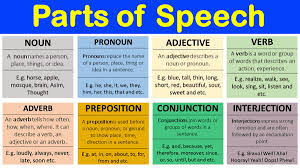Nouns
A noun is a word that refers to a person, concept, place, or thing. Nouns can act as the subject of a sentence (i.e., the person or thing performing the action) or as the object of a verb (i.e., the person or thing affected by the action).
There are numerous types of nouns, including common nouns (used to refer to nonspecific people, concepts, places, or things), proper nouns (used to refer to specific people, concepts, places, or things), and collective nouns (used to refer to a group of people or things).
Ella lives in France.
Pronouns
A pronoun is a word used in place of a noun. Pronouns typically refer back to an antecedent (a previously mentioned noun) and must demonstrate correct pronoun-antecedent agreement. Like nouns, pronouns can refer to people, places, concepts, and things.
There are numerous types of pronouns, including personal pronouns (used in place of the proper name of a person), demonstrative pronouns (used to refer to specific things and indicate their relative position), and interrogative pronouns (used to introduce questions about things, people, and ownership).
I don’t really know her.
Verbs
A verb is a word that describes an action (e.g., “jump”), occurrence (e.g., “become”), or state of being (e.g., “exist”). Verbs indicate what the subject of a sentence is doing. Every complete sentence must contain at least one verb.
Verbs can change form depending on subject (e.g., first person singular), tense (e.g., simple past), mood (e.g., interrogative), and voice (e.g., passive voice).
Regular verbs are verbs whose simple past and past participle are formed by adding“-ed” to the end of the word (or “-d” if the word already ends in “e”). Irregular verbs are verbs whose simple past and past participles are formed in some other way.
I wash the car.
Adjectives
An adjective is a word that describes a noun or pronoun. Adjectives can be attributive, appearing before a noun (e.g., “a red hat”), or predicative, appearing after a noun with the use of a linking verb like “to be” (e.g., “the hat is red”).
Adjectives can also have a comparative function. Comparative adjectives compare two or more things. Superlative adjectives describe something as having the most or least of a specific characteristic.
The dog is bigger than the cat.
Adverbs
An adverb is a word that can modify a verb, adjective, adverb, or sentence. Adverbs are often formed by adding “-ly” to the end of an adjective (e.g., “slow” becomes “slowly”), although not all adverbs have this ending, and not all words with this ending are adverbs.
There are numerous types of adverbs, including adverbs of manner (used to describe how something occurs), adverbs of degree (used to indicate extent or degree), and adverbs of place (used to describe the location of an action or event).
Talia writes quite quickly.
Prepositions
A preposition is a word (e.g., “at”) or phrase (e.g., “on top of”) used to show the relationship between the different parts of a sentence. Prepositions can be used to indicate aspects such as time, place, and direction.
Hasan is coming for dinner at 6 p.m.
Conjunctions
A conjunction is a word used to connect different parts of a sentence (e.g., words, phrases, or clauses).
The main types of conjunctions are coordinating conjunctions (used to connect items that are grammatically equal), subordinating conjunctions (used to introduce a dependent clause), and correlative conjunctions (used in pairs to join grammatically equal parts of a sentence).
Daria likes swimming and hiking.
Interjections
An interjection is a word or phrase used to express a feeling, give a command, or greet someone. Interjections are a grammatically independent part of speech, so they can often be excluded from a sentence without affecting the meaning.
Ouch! I hurt my arm.
